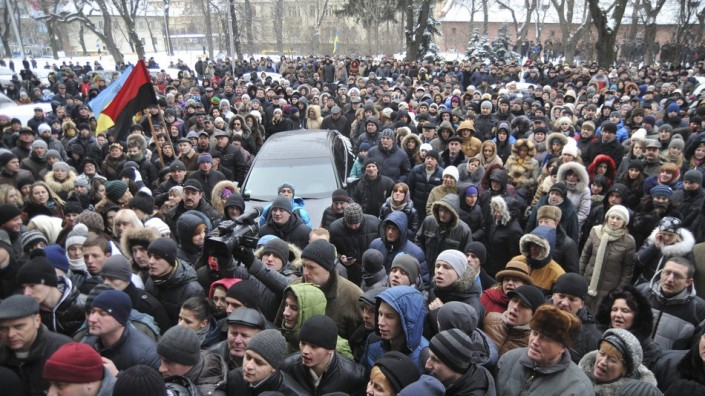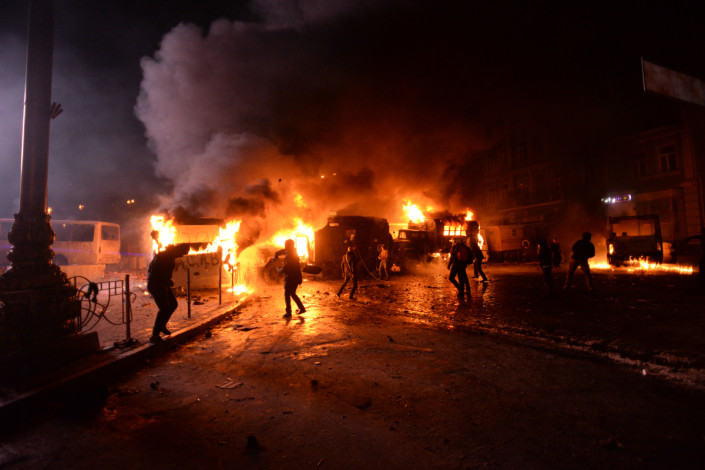Resource Library
What Do Ukrainians Want?
By Craig Charney | Insights | Series II | No. 4 | May 2014
In the confused debate on Ukraine’s whirlwind of change since the fall of its pro-Russian president in February and Russia’s subsequent takeover of Crimea, one key question has often been lost sight of: what do Ukrainians really want?
One line of thinking portrays Ukraine as riven by ethnic cleavages – Bosnia on the Dniepr – and holds that people in eastern Ukraine might prefer Russian control to Kyiv’s new authorities. This view has been strengthened by media reports of pro-Russian crowds seizing government facilities in the east. Another nervously regards Russian troops massed on Ukraine’s eastern frontier and sees Western economic or military assistance as the sole salvation of the hapless former Soviet republic.

Yet recent polls show these images don’t square with Ukrainian reality. While there are cultural and political differences between Ukraine’s regions, everywhere but Crimea most citizens feel strongly that they are Ukrainian. Indeed, the data reveal a surprisingly broad consensus on the recent revolution, relations with Russia and even the bedrock of identity.
If these realities are ignored, policymakers in Washington and Moscow alike risk miscalculation. If Russian soldiers enter eastern Ukraine, they may face not flag-waving crowds, as in Crimea, but angry resistance and Molotov cocktails. While sanctions, aid, and NATO actions all can help deter Russian adventurism in Ukraine, the greatest check it faces may be the force of Ukrainian public opinion.
Ukraine’s east – more Russian in language and Orthodox in religion – does differ somewhat in outlook from its west, which is more Ukrainian-speaking and Catholic. Unlike western Ukrainians, easterners voted for ex-president Viktor Yanukovich, and like him favored a customs union with Russia over European Union integration. They also suspected the protests leading to his ouster, mostly in the west, were fruits of American and European influence, polling by the Kiev International Institute of Sociology (KIIS) found.

Yet far from mourning his departure – or cheering Russian intervention after – most eastern Ukrainians shared westerners’ reactions to them. A March poll by GfK Ukraine found two-thirds of Easterners backed Yanukovich’s impeachment, after he fled from office and his massive corruption was revealed. It also reported that under one-fourth of easterners thought Russia’s annexation of Crimea was justified.
Ukrainians want an open-door policy towards Russia – but not a Russian takeover. Around six in ten favor an open border with no visas, as between the U.S. and Canada, a poll by the SOCIS market research agency reported this month. But the share who want their region to join Russia is in single digits among easterners, as in the west, the Razumkov Center reported in December and the SOCIS poll confirmed. Wherever they live, Ukrainians want to keep their sovereignty. “The population of Ukraine clearly has no great desire that Ukraine should be part of Russia,” says KIIS CEO Vladimir Paniotto.
They also reject splitting Ukraine into a federation, which Moscow has demanded, in order to turn the east into a Russian protectorate, or taking control of government offices to support the demand. A federal state is backed by just 22% in the east and 12% in the west, the Razumkov poll found, and the SOCIS study this month found an equally strong rejection of the federal scheme. In April, three-fourths of Easterners rejected the seizure of administrative buildings in their regions by pro-Russian forces, a KIIS poll noted.
In fact, rather than enticing Ukrainians into the arms of Mother Russia, Putin’s maneuvers have repelled them. A year ago the Pew Center found the majority of Ukrainians (56%) viewed him favorably; by this April, a new Pew study reported, just 22% did.
On the core issue of national identity, Razumkov showed in Jan. 2013 that substantial majorities of residents in almost all regions saw Ukraine as their homeland. (The only exception was Crimea.) Even larger proportions called themselves Ukrainian patriots, 88% in the east, 99% in the west, in Razumkov’s December survey.
Of course, significant regional differences remain. As new elections approach on May 25, easterners are suspicious of all Ukrainian politicians, today’s western-based revolutionaries and yesterday’s graft-ridden rulers from the east, Gfk found in February. The Pew poll found a split between East and West on whether Russian should retain official language status, which Ukrainian nationalists in the new regime foolishly threatened in their first heady days in power.
But despite their differences, Ukrainians country-wide value their independence. A Russian re-occupation of eastern Ukraine would risk mass opposition, perhaps even partisan insurgency. In making their decisions, geo-politicians East and West should keep in mind that Ukrainians think Russia is a nice place to visit – but they wouldn’t want to live there.


